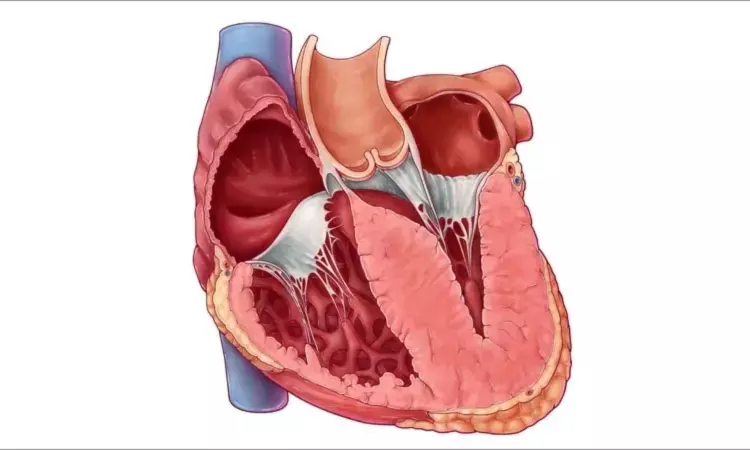- Home
- Medical news & Guidelines
- Anesthesiology
- Cardiology and CTVS
- Critical Care
- Dentistry
- Dermatology
- Diabetes and Endocrinology
- ENT
- Gastroenterology
- Medicine
- Nephrology
- Neurology
- Obstretics-Gynaecology
- Oncology
- Ophthalmology
- Orthopaedics
- Pediatrics-Neonatology
- Psychiatry
- Pulmonology
- Radiology
- Surgery
- Urology
- Laboratory Medicine
- Diet
- Nursing
- Paramedical
- Physiotherapy
- Health news
- Fact Check
- Bone Health Fact Check
- Brain Health Fact Check
- Cancer Related Fact Check
- Child Care Fact Check
- Dental and oral health fact check
- Diabetes and metabolic health fact check
- Diet and Nutrition Fact Check
- Eye and ENT Care Fact Check
- Fitness fact check
- Gut health fact check
- Heart health fact check
- Kidney health fact check
- Medical education fact check
- Men's health fact check
- Respiratory fact check
- Skin and hair care fact check
- Vaccine and Immunization fact check
- Women's health fact check
- AYUSH
- State News
- Andaman and Nicobar Islands
- Andhra Pradesh
- Arunachal Pradesh
- Assam
- Bihar
- Chandigarh
- Chattisgarh
- Dadra and Nagar Haveli
- Daman and Diu
- Delhi
- Goa
- Gujarat
- Haryana
- Himachal Pradesh
- Jammu & Kashmir
- Jharkhand
- Karnataka
- Kerala
- Ladakh
- Lakshadweep
- Madhya Pradesh
- Maharashtra
- Manipur
- Meghalaya
- Mizoram
- Nagaland
- Odisha
- Puducherry
- Punjab
- Rajasthan
- Sikkim
- Tamil Nadu
- Telangana
- Tripura
- Uttar Pradesh
- Uttrakhand
- West Bengal
- Medical Education
- Industry
Metoprolol reduces LVOT obstruction in obstructive hypertrophic cardiomyopathy: JACC

Denmark: Treatment with metoprolol in patients with symptomatic obstructive hypertrophic cardiomyopathy (HCM) significantly reduced left ventricular outflow tract (LVOT) obstruction at rest and during exercise, shows findings from TEMPO trial. Also, it improved quality of life and provided symptom relief however there was no change in maximum exercise capacity. The study appears in the Journal of the American College of Cardiology (JACC).
The utility of β-adrenergic receptor blocking agents for symptomatic patients with obstructive HCM rests on clinical experience and observational cohort studies. Anne M. Dybro, Department of Cardiology, Aarhus University Hospital, Aarhus N, Denmark, and colleagues therefore aimed to the examine effects of metoprolol on LVOT obstruction, symptoms, and exercise capacity in patients with obstructive HCM in a double-blind, placebo-controlled, randomized crossover trial (TEMPO trial).
The study enrolled 29 patients with obstructive HCM and New York Heart Association (NYHA) functional class II or higher symptoms. They were randomised to receive metoprolol or placebo for 2 consecutive 2-week periods. The effect parameters included NYHA functional class, LVOT gradients, cardiopulmonary exercise testing, Kansas City Cardiomyopathy Questionnaire Overall Summary Score (KCCQ-OSS), and Canadian Cardiovascular Society (CCS) angina class.
The study revealed the following findings:
- Compared with placebo, the LVOT gradient during metoprolol was lower at rest (25 mm Hg vs 72 mm Hg), at peak exercise (28 mm Hg vs 62 mm Hg), and postexercise (45 mm Hg vs 115 mm Hg).
- During metoprolol treatment, 14% of patients were in NYHA functional class III or higher compared with 38% of patients receiving placebo. Similarly, no patients were in CCS class III or higher during metoprolol treatment compared with 10% during placebo treatment.
- These findings were confirmed by higher KCCQ-OSS during metoprolol treatment (76.2 ± 16.2 vs 73.8 ± 19.5).
- Measures of exercise capacity, peak oxygen consumption, and N-terminal pro–B-type natriuretic peptide did not differ between the study arms.
The authors conclude that in patients with obstructive HCM, metoprolol reduced LVOT obstruction at rest and during exercise, provided symptom relief, and improved quality of life compared with placebo. There was no change in maximum exercise capacity.
Reference:
The study titled, "Randomized Trial of Metoprolol in Patients With Obstructive Hypertrophic Cardiomyopathy," is published in the Journal of the American College of Cardiology.
DOI: https://www.jacc.org/doi/10.1016/j.jacc.2021.07.065
Dr Kamal Kant Kohli-MBBS, DTCD- a chest specialist with more than 30 years of practice and a flair for writing clinical articles, Dr Kamal Kant Kohli joined Medical Dialogues as a Chief Editor of Medical News. Besides writing articles, as an editor, he proofreads and verifies all the medical content published on Medical Dialogues including those coming from journals, studies,medical conferences,guidelines etc. Email: drkohli@medicaldialogues.in. Contact no. 011-43720751


